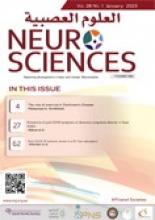Abstract
Objectives: To determine the prevalence of Obsessive-Compulsive Disorder (OCD) symptoms in patients who have survived COVID-19.
Methods: The study used an observational cross-sectional design between July and October 2021. The target population was adult patients who had confirmed COVID-19 infection prior to joining the study, OCD symptoms were assessed using the Arabic OCD scale created by Abohendy and colleagues, which included 83 questions covering 12 different domains and was administired online.
Results: A total of 356 patients were included in the analysis. Approximately 9.0% and 1.7% of the patients had a history of psychiatric disease and OCD diagnosis (respectively). The total symptom score was 32.8%. The most frequently reported domains were rumination of ideas (55.5%), re-checking compulsions (37.0%), and slowness (34.0%), while the least frequently reported domains included obsessive impulses (26.3%), obsessive images (26.5%), and religious compulsions (26.8%). Unlike other domains, the purity and cleanliness compulsions scores were significantly higher than the scale reference population. A higher total symptom score was observed in psychiatric patients (p=0.004) and, to a lesser extent, in OCD patients (p=0.250).
Conclusion: Overall, OCD symptoms, including cleanliness and fear of disease obsessions, tend to be higher in psychiatric and OCD patients, these findings are valuable for future studies.
Footnotes
Disclosure. Authors have no conflict of interests, and the work was not supported or funded by any drug company.
- Received June 5, 2022.
- Accepted October 25, 2022.
- Copyright: © Neurosciences
Neurosciences is an Open Access journal and articles published are distributed under the terms of the Creative Commons Attribution-NonCommercial License (CC BY-NC). Readers may copy, distribute, and display the work for non-commercial purposes with the proper citation of the original work.






